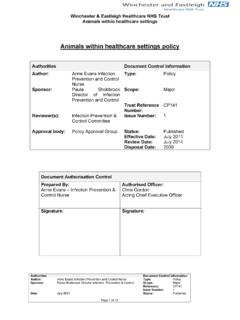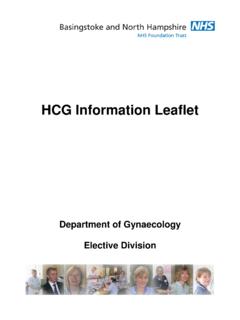Transcription of Guidelines for Management of Adult Asplenic Patients
1 Updated march 2012 (supersedes version December 2011) Page 1 of 2 Review Date: march 2014 Guidelines for Management of Adult Asplenic Patients Following a splenectomy there is a considerably increased risk of developing septicaemia from invasive organisms, namely Streptococcus pneumoniae, Haemophilus influenzae type b and meningococcus. Asplenic Patients are also at risk from malaria, babesiosis (associated with tick bites), Escherichia coli and Capnocytophaga canimorsus (associated with dog bites). These Guidelines are equally applicable to hospitalised Patients as to Patients in the community. They are also applicable not only to individuals who have recently had their spleen removed but also to those Patients that have been identified at a later date of having hyposplenism, regardless of cause. The following vaccinations are recommended.
2 Ideally vaccinations should be given four to six weeks before elective splenectomy or initiation of chemotherapy and/or radiotherapy. Where this is not possible they can be given up to two weeks before or at least two weeks post-splenectomy. (See Company literature for full details including contra-indications, and Department of Health: Immunisation against Infectious Disease 1). Table 1. Schedule for immunisation with conjugate vaccines in individuals with hyposplenism Vaccination Schedule Patient Group Month 0 Month 1 Later 18 years and older (regardless of vaccination history) Hib/MenC vaccine PPV MenACWY conjugate vaccine Patients for Elective Pseudomyxoma Surgery Only 3 Hib/MenC vaccine PPV MenACWY conjugate vaccine 3 months after surgery/ chemotherapy** NOTES: Testing antibody levels prior to initial vaccination is not required PPV = pneumococcal polysaccharide vaccine Hib = Haemophilus influenzae type B vaccine, MenC = Meningococcal C conjugate vaccine MenACWY= Meningococcal A, C, W135 and Y (tetravalent) conjugate vaccine **Consider measuring immune response to MenACWY one month after second dose Vaccine doses: 1.
3 Pneumococcal polysaccharide vaccine (PPV) by SC or IM injection (available as Pneumovax II ) 2. Haemophilus influenzae (Hib)/Meningococcal C conjugate vaccine by IM injection (available as Menitorix ) 3. Meningococcal A, C, W135 and Y conjugate vaccine by IM injection (available as Menveo & ACWY Vax ) Prescribing and administering the vaccines For inpatients the vaccines should be prescribed as a Stat dose on the electronic JAC prescribing system or if using the paper chart, in the Once Only and Pre Anaesthetic Medication section. All the recommended vaccines are inactivated, so if necessary they can all be given at the same time; however they must be administered at different sites. Patients with other causes of asplenism In general, immunisation should be delayed for at least six months after immunosuppressive chemotherapy. The General Practitioner will prescribe antibiotics and provide boosters of vaccine as advised by the Consultant Haematologists.
4 Booster doses Booster doses are only required for pneumococcal polysaccharide vaccine (PPV). Most hyposplenic individuals should be routinely boosted 5 years after the last dose of pneumococcal vaccine. A small number of Patients (those with sickle cell disease or lymphoproliferative disorders) should have their pneumococcal antibody levels checked 3 years after the last dose of vaccine and a booster should be given if levels march 2012 (supersedes version December 2011) Page 2 of 2 Review Date: march 2014 Antibiotic prophylaxis is advisable in all Patients , but is particularly important in the highest risk groups (those under the age of five and immunocompromised individuals). The risk is greatest in the first two years but is advisable to be taken life-long in the high-risk group of Patients . Antibiotic Oral prophylaxis Alternative intravenous if oral route not possible Phenoxymethylpenicillin (Penicillin V ) 500mg twice daily Benzylpenicillin 600mg IV 12hourly Clarithromycin (penicillin allergic) 250mg once daily Clarithromycin 250-500mg IV 12 hourly Emergency antibiotics All Patients should be given a course of Emergency antibiotics on discharge to take in the event of an acute febrile illness (in addition to urgently contacting their GP).
5 Antibiotic For penicillin allergic Patients or at high risk of Clostridium difficile Co-amoxiclav (7 day course) 625mg three times a day Azithromycin (3 day course) 500mg once daily Treatment of Animal Bites If a hyposplenic patient receives an animal bite or scratch that breaks the skin, they should be given a 5-day course of Co-amoxiclav or a 3-day course of Azithromycin. General Advice On discharge, the relevant parts of the Splenectomy pack need to be completed by the House Officer (available from Theatres, C and G Floor or Pathology). This contains, a. a sticky label that needs to be attached to the patient s notes, b. a splenectomy warning card that needs to be completed and given to the patient, c. a patient information leaflet that needs to be completed and given to the patient, d. a GP letter that needs to be completed and sent to GP. e. a Department of Health patient information leaflet. Annual Influenza vaccination should also be given.
6 It may be given at the same time as pneumococcal vaccine, but a different site. Ask patient to see their GP about this. Patients travelling to malaria areas should be advised carefully about prophylaxis. Patients travelling abroad to high risk areas (including Saudi Arabia during the Hajj and Umrah pilgrimages, sub-Saharan Africa) will need to be vaccinated with the Meningococcal polysaccharide ACWY vaccine, even if they have already been vaccinated with the Meningococcal C conjugate vaccine. If in doubt consult Microbiologist. For general travel advice see NaTHNac website: Adults who have been fully immunised with MenC as part of the routine childhood programme, but who then develop splenic dysfunction, should be immunised with a dose of Hib/Men C vaccine (Menitorix ). Encourage Patients to wear medic-alert bracelet (available from Medic-Alert Foundation). Patients need to be aware that they are more vulnerable to infection after tick and animal bites, and therefore need to seek medical attention if bitten.
7 Patients must be advised to present themselves immediately to their GP or the Accident & Emergency Department if they have rigor or an acute febrile illness. In general, immunisation should be delayed for at least 6 months after immunosuppressive chemotherapy or radiotherapy. The General Practitioner will prescribe antibiotics and provide boosters of vaccine as advised by the Haematologists. If Patients are admitted to hospital presenting with a non-specific infective illness it is essential to treat immediately with an appropriate antibiotic. For adults we suggest Cefotaxime 2g intravenously six hourly. Doses will need to be reviewed in the case of renal or hepatic impairment. References 1. Guidance on minimising infection in Patients with an absent or dysfunctional spleen. Health Protection Agency. December 2007 (Review date: December 2010) 2. Immunisation against Infectious Disease.
8 The Green Book . Department of Health. , accessed August 2011) 3. Communication with Dr Shamez Ladhani, Health Protection Agency, Colindale, London. 21 November 2011 Compiled by Dr Jorge Cepeda, Consultant Microbiologist & the AMT Dr Alison Milne, Consultant Haemoatologist Priya Mistry, Nutrition & Pseudomyxoma Specialist Pharmacist



